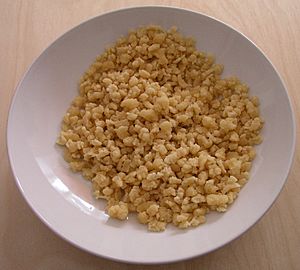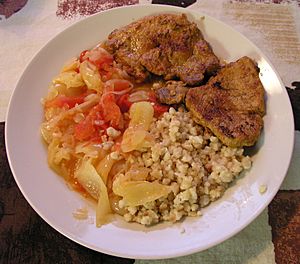Tarhonya facts for kids
Tarhonya (say "TAR-hon-yah") is a special type of noodle. It's made with eggs and is very popular in Hungary and other parts of Central Europe. In Hungarian, it's called tarhonya, and in Slovak, it's tarhoňa.
This noodle might have come from the Ottoman Empire and Turkish cuisine. The name could be linked to a Turkish word, tarhana, or even a Persian word, tarkhane. People sometimes call it "barley noodle" because it looks a bit like cooked pearl barley. Because the pieces are quite big, some people think of it as a small dumpling.
Contents
What is Tarhonya?
Tarhonya is a simple food made from basic ingredients. It uses water, wheat flour, and whole eggs. These ingredients are mixed together to make a dough.
How is Tarhonya Made?
The dough is then shaped into small "grains" that are about the size of barley. This can be done by hand, or by cutting or grating the dough. The way it looks is similar to large couscous.
Tarhonya has been around for a long time. It was even mentioned in Hungarian cookbooks written way back in the 1500s!
How to Cook and Enjoy Tarhonya
Once the small grains of tarhonya are made, they are dried. Drying helps to keep them fresh so they can be stored for a long time.
Cooking Steps
When it's time to cook tarhonya, there are a few steps. First, the dried grains are often roasted. This means they are lightly cooked in a pan, usually with butter or lard. In Hungary, it's very common to fry tarhonya in butter or lard before boiling it.
After roasting, the tarhonya is boiled in water until it's soft. It cooks much like other types of pasta or noodles.
Serving Tarhonya
Tarhonya is a very versatile side dish. This means it can be served with many different kinds of meals.
You can find tarhonya served with:
- Meat or vegetable stews
- Dishes made with eggs
- Roasted chicken or other poultry
- Fried sausages
- Fresh salads
It adds a delicious and filling touch to many traditional Central European meals.
See also
 In Spanish: Tarhonya para niños
In Spanish: Tarhonya para niños
 | Selma Burke |
 | Pauline Powell Burns |
 | Frederick J. Brown |
 | Robert Blackburn |



